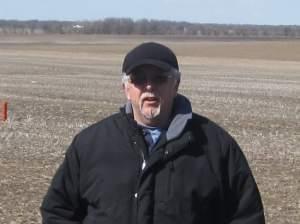Congressman Davis Takes on Farm Bill
The U.S. House Agriculture Committee is expected to start marking up the new Farm Bill on Wednesday. U.S. Rep. Rodney Davis (R-Taylorville) is one of the new members of Congress working on the measure.
The 2008 Farm Bill expired last September, but parts of it have been extended until this coming September. It covers everything from crop subsidies to nutrition programs for the poor.
There might some some question as to what Rep. Davis can accomplish, having been in office for about three months. But a farmer and two industry experts say they are approaching the debate with some optimism.
 John Robinson (pictured on the left) is a fourth generation farmer in rural Monticello. In his office (pictured below), he keeps toy versions for every real tractor he has used out in the field.
John Robinson (pictured on the left) is a fourth generation farmer in rural Monticello. In his office (pictured below), he keeps toy versions for every real tractor he has used out in the field.
"It's fun," Robinson said of his hobby. "That way, when something happens to me, I can say 'these are the tractors that I had."
A photo of John's grandfather on the old family farm near Deland serves as his computer wallpaper. Political memorabilia hangs on the walls, mostly from old-line Republicans like Barry Goldwater and Chuck Percy.
Congressman Davis is not included on the wall yet. But Robinson said he supports his new representative, and thinks he will be successful if he can cut waste from the new Farm Bill.
But he said some things need to be preserved, including the federal crop insurance program - as long as growers understand its purpose.
“It’s not a ‘be all to get all," he said. "It’s a situation to get you to the next year. And again, it’s subsidized, but subsidized with a purpose because you want to encourage people to take this kind of insurance. So you can lessen your risk.”
Congressman Davis said crop insurance works - covering farmers for their losses just as others are insured for their car and home.
While Davis, Robinson, and ag policy leaders want to keep that subsidized program going, they are seeking an end to another subsidy - the direct payment farm subsidy. That program is meant to give farmers extra money for their crops and guarantee a price floor. But it has paid out regardless of the acreage planted, or how much the crops brings in each year.
Davis said those in his district who raise corn and soybeans are willing to give up the direct payment subsidies, and do their part to tackle a $16.6 trillion national debt.
“And the key, though is all the ag sectors working together to find out what’s going to work," he said. "It’s just like what we should do to govern out in Congress on every single piece of legislation. There’s got to be some give and take.”
John Robinson said there is much more at stake in the new Farm Bill than helping farmers facing production losses- if drought conditions persist in 2013. He said more than half the money in the Farm Bill goes towards nutrition programs like SNAP, also known as food stamps.
One industry expert believes Davis, a former staffer to neighboring Republican Congressman John Shimkus of Collinsville, can have some success in this area.
“The Congressman’s connections to a lot of folks in Central Illinois, who have been through those battles, should help prepare him very well to assume the leadership that we all expect him to take," said Jon Scholl, president of the Washington, D.C. American Farmland Trust. The conservation group works with Congress to protect soil and water.
Despite Scholl's optimism for Davis and what he calls a renewed sense of bipartisanship, Scholl said items like SNAP and the overall federal budget could lead to a contentious debate.
"The really big difference comes in the amount of money that’s being cut from the SNAP, or nutrition programs in general," he said. "And it’s a difference of almost 100 million dollars. And trying to reconcile that is going to be very contentious, and it’s going to be that’s going to make perhaps more than anything else, a farm bill difficult to attain.”
Scholl said it could take the end of the year before the House and Senate agree on the measure. That’s where the contacts that Davis developed while a congressional staffer could help - according to Kevin Johnson. He’s a one-time staffer for former Urbana Congressman Tim Johnson (no relation) who’s now with the Illinois Chemical and Fertilizer Association.
"You’re not going to be an expert on every issue, even if you’re on the ag committee," Johnson said. "I think as a staffer and a member, that’s your biggest thing. You’re trying to keep your ear to the ground - What issues are coming your way, so you’re ahead of those issues.”
Congressman Davis said there is a renewed sense of optimism in Congress, after members got bogged down last year in partisan bickering.
“Some of my best friends in my freshman class are Democrats," he said. "We’re willing to work together. I believe when you saw this last election – an election that both thought it would swing their way. Neither side did. I think that’s what shows a lot members of Congress that major pieces of legislation shouldn’t be about political partisanship – and polarization.”
Davis said that as the only Illinois Republican on the House Ag Committee, he feels the need to take a statewide view on issues.
With that in mind, he and freshman Bill Enyart (D-Belleville) have co-sponsored a measure – separate from the farm bill - that seeks to help commercial river traffic, on the Mississippi River during droughts and floods.
"If we don’t have access to that navigation channel down the Mississippi to get that product out – to get our coal – and get our corn –and get our soybeans out, than we don’t have jobs," Davis said. "So it is a crucial element to our Midwestern success economically, and that’s why we’re trying to lead in a bipartisan way on this issue.”
Oklahoma Republican and House Agriculture Committee Chair Frank Lucas said he will move ahead with a markup - or formal revision and drafting - of the next Farm Bill by May 15.
Davis said he is excited to have a seat at the table, but also expects some late nights as that markup process begins.
As for John Robinson, while he supports Davis, he said he prefers not to deal with the politicians. He is saving most of his feedback on the Farm Bill for staff at the U.S. Department of Agriculture.
"I want to deal with the people that are running the programs," he said. "Because they are wanting to know how the programs are working out in the countryside. And they think talking to farmers is very valuable."
The Senate Agriculture Committee was expected to start its own markup process early next week, likely on Tuesday. Congressman Davis believes the new farm bill could be approved by both chambers by September, around the time the last provisions of the old Farm Bill expire.

